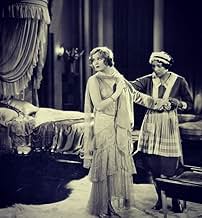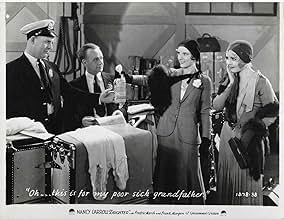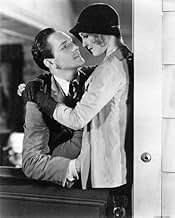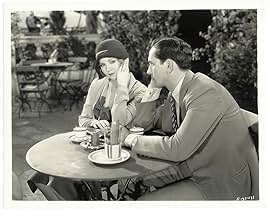Agrega una trama en tu idiomaA former chorus girl weds a millionaire after the composer she loves leaves. Meanwhile, she strings along an artist in love with her. When the composer returns, she struggles with her needs ... Leer todoA former chorus girl weds a millionaire after the composer she loves leaves. Meanwhile, she strings along an artist in love with her. When the composer returns, she struggles with her needs for security vs love. High jinks and drama ensue.A former chorus girl weds a millionaire after the composer she loves leaves. Meanwhile, she strings along an artist in love with her. When the composer returns, she struggles with her needs for security vs love. High jinks and drama ensue.
- Dirección
- Guionistas
- Elenco
- Nominado a 1 premio Óscar
- 3 premios ganados y 1 nominación en total
Eric Blore
- Party Guest in Angel Costume
- (sin créditos)
Charles Halton
- Winslow - Gibson's Secretary
- (sin créditos)
Duncan Penwarden
- Mr. Miller
- (sin créditos)
Opiniones destacadas
"Laughter" is a glorious romantic comedy with a terrific cast including that great man of the screen, Fredric March. It concerns a young woman who has married for stability and wealth, but can't forget the love of her life, played by the delicious Mr March. It was made at Paramount's Long Island studios, and some scenes were shot on location in New York, giving the movie a different "look" to many others of the period. Some people think of this movie as the first "Screwball" comedy. "Laughter" was Frank Morgan's first talkie and the last movie for Diane Ellis who plays his daughter. She died on her honeymoon in December 1930.
I watched LAUGHTER, a 1930 film starring Nancy Carroll and Fredric March. Many comments and reviews state this film as a forerunner of the 30s screwball comedy. Yes there were some screwball elements, such as the silly sequence when the stars, caught in the rain, break into a house and put on bear rugs while their clothes dry. There's also a terrific scene when March is playing piano when the butler (Leonard Carey) tries to correct him. They end up playing duets! There's also a nice party scene where Eric Blore shows up in an angel costume. Another standout scene is when the daughter (Diane Ellis) starts to jazz dance and is joined by Carroll while Frank Morgan sourly looks on. Also of interest is Pearl the maid, played by Ollie Burgoyne, who was better known as Olga Burgoyne, a dancer in many stage shows.
Still, I don't see this film as a comedy, let alone a screwball comedy. Carroll (she's very good) plays a former show girl who marries Morgan for his money. His daughter is only a little younger than Carroll. The daughter is a little wild; Carroll is a lot bored. She has everything in her life but "laughter." When she takes up with March, we know the marriage is doomed. So does everyone else.
Morgan's character hasn't an ounce of humor in him. There's also a tragic starving artist type (Glenn Anders) who gets involved with Ellis. It's with this character that any shred of comedy drains from the picture as doom settles over the storyline.
This is still a very good film with solid work from its stars.
Still, I don't see this film as a comedy, let alone a screwball comedy. Carroll (she's very good) plays a former show girl who marries Morgan for his money. His daughter is only a little younger than Carroll. The daughter is a little wild; Carroll is a lot bored. She has everything in her life but "laughter." When she takes up with March, we know the marriage is doomed. So does everyone else.
Morgan's character hasn't an ounce of humor in him. There's also a tragic starving artist type (Glenn Anders) who gets involved with Ellis. It's with this character that any shred of comedy drains from the picture as doom settles over the storyline.
This is still a very good film with solid work from its stars.
...And she's buying a STAIRWAY TO HEAVEN
Not sure whether Led Zeppelin were inspired by this film but but the theme, or rather the song remains the same which is as Paul McCartney wrote: MONEY CAN'T BUY ME LOVE.
It's somewhat idealistic since that hippie dream of non-materialism probably grated a bit with the audience of 1930. The Great Depression had just started and millions of Americans were now forced into poverty and even starvation so maybe they didn't have a lot of sympathy for Nancy Carroll's millionaire character bemoaning lack of excitement in her privileged life.
Nancy Carroll plays Peggy, a former Zigfield girl who's achieved the classic chorus girl dream of marrying a millionaire. But it's a case of: 'be careful what you wish for' because despite the diamonds and the mansion, she's not cut out to be just a demure, subservient trophy wife and is still seeing a couple of men behind her husband's back. One has to be sorry for the husband - cheating on The Wizard of Oz just isn't right!
It's worth sticking with this - although it starts off a bit slow and 'arty' it quickly speeds up and evolves into a really absorbing, witty and enjoyable drama. You have to pinch yourself at times to remind you that this was made in 1930. The acting is perfect and natural - as far away from that awful static, stagey style common in those very early sound films as is imaginable. There's even a musical score, there's classy art-deco sets, there's realistic dialogue and unlike most films of this age, very fluid camerawork with innovative and imaginative tracking shots - it's like nothing you'd expect from 1930.
What makes this special is its director Harry d'Abbadie d'Arrast whose talent lives up to his cool name. Had a lesser director made this it could have become just the typical dross of 1930 but considering the limitations of film making at the dawn of the sound age, he works miracles. He truly brings the story and the characters to life and imbues it with wit, humour and humanity. He even brings honesty to the happy ending by tempering it with real life since as the song goes: And a new day will dawn for those who stand long and the forests will echo with laughter.
Not sure whether Led Zeppelin were inspired by this film but but the theme, or rather the song remains the same which is as Paul McCartney wrote: MONEY CAN'T BUY ME LOVE.
It's somewhat idealistic since that hippie dream of non-materialism probably grated a bit with the audience of 1930. The Great Depression had just started and millions of Americans were now forced into poverty and even starvation so maybe they didn't have a lot of sympathy for Nancy Carroll's millionaire character bemoaning lack of excitement in her privileged life.
Nancy Carroll plays Peggy, a former Zigfield girl who's achieved the classic chorus girl dream of marrying a millionaire. But it's a case of: 'be careful what you wish for' because despite the diamonds and the mansion, she's not cut out to be just a demure, subservient trophy wife and is still seeing a couple of men behind her husband's back. One has to be sorry for the husband - cheating on The Wizard of Oz just isn't right!
It's worth sticking with this - although it starts off a bit slow and 'arty' it quickly speeds up and evolves into a really absorbing, witty and enjoyable drama. You have to pinch yourself at times to remind you that this was made in 1930. The acting is perfect and natural - as far away from that awful static, stagey style common in those very early sound films as is imaginable. There's even a musical score, there's classy art-deco sets, there's realistic dialogue and unlike most films of this age, very fluid camerawork with innovative and imaginative tracking shots - it's like nothing you'd expect from 1930.
What makes this special is its director Harry d'Abbadie d'Arrast whose talent lives up to his cool name. Had a lesser director made this it could have become just the typical dross of 1930 but considering the limitations of film making at the dawn of the sound age, he works miracles. He truly brings the story and the characters to life and imbues it with wit, humour and humanity. He even brings honesty to the happy ending by tempering it with real life since as the song goes: And a new day will dawn for those who stand long and the forests will echo with laughter.
Up until July, 1934, the job of policing the films out of Hollywood was mostly left up to Hollywood. There was no rating system and practically anything might appear in movies. While not extremely common, nudity, adultery, abortion, homosexuality and promiscuity were featured in quite a few pictures...including in Biblical epics such as "Ben Hur" (1925) and "The Sign of the Cross". Often, when folks use the term 'pre-code' they are usually referring to the more extreme films of this era...and "Laughter" clearly is a pre-code plot, as its main theme is adultery.
When the film begins, you learn that Peggy (Nancy Carroll) has married a rich guy (Frank Morgan). But she also has had some admirers--including a suicidal artist and one lover (Frederic March) who stops by for a visit! Now Peggy must decide whether she wants to stay married to the rich man or run off with fun-loving Paul.
Post 1934, such plots clearly would NOT have been allowed until, perhaps, the 1960s. The notion of an old boyfriend showing up and the young wife going off with him to spend a day with him was just too broadminded for the post-code days...and hard to believe that the husband would just sit back and allow this outing to take place. It is, however, reasonably interesting to watch though not the comedy I expected (IMDB called it a comedy romance...but there were very few laughs). Worth your time...especially if you are a pre-code fan but not a fan I'd rush to see either.
When the film begins, you learn that Peggy (Nancy Carroll) has married a rich guy (Frank Morgan). But she also has had some admirers--including a suicidal artist and one lover (Frederic March) who stops by for a visit! Now Peggy must decide whether she wants to stay married to the rich man or run off with fun-loving Paul.
Post 1934, such plots clearly would NOT have been allowed until, perhaps, the 1960s. The notion of an old boyfriend showing up and the young wife going off with him to spend a day with him was just too broadminded for the post-code days...and hard to believe that the husband would just sit back and allow this outing to take place. It is, however, reasonably interesting to watch though not the comedy I expected (IMDB called it a comedy romance...but there were very few laughs). Worth your time...especially if you are a pre-code fan but not a fan I'd rush to see either.
Ha ha. Nice line from Fredric March (Paul) who plays a musician who is in love with chorus girl Nancy Carroll (Peggy). However, she has married wealthy bore Frank Morgan (Mr Gibson). She has wealth but no laughter in her life which is what March returns to see her about. But there is also someone else on the scene - artist Glenn Anders (Ralph). This side of the story is pretty heavy-going and throws in some real drama to the proceedings.
The side story with Anders takes you down a route that you don't expect in a comedy but it has pivotal significance for the character of Nancy. The acting is good from all and March and Carroll have a good chemistry and carefree attitude which comes across well. There are several funny scenes, eg, when the two lovebirds break into a stranger's house, the piano sequence with March and the butler Leonard Carey and the spontaneous dancing from Carroll and Morgan's daughter Diane Ellis (Marjorie) to name a few. This was to be the last film made by Ellis who died at age 20 whilst on honeymoon in India.
Finally, I can't wait to start calling people from Hell.
The side story with Anders takes you down a route that you don't expect in a comedy but it has pivotal significance for the character of Nancy. The acting is good from all and March and Carroll have a good chemistry and carefree attitude which comes across well. There are several funny scenes, eg, when the two lovebirds break into a stranger's house, the piano sequence with March and the butler Leonard Carey and the spontaneous dancing from Carroll and Morgan's daughter Diane Ellis (Marjorie) to name a few. This was to be the last film made by Ellis who died at age 20 whilst on honeymoon in India.
Finally, I can't wait to start calling people from Hell.
¿Sabías que…?
- TriviaOrson Welles cast scene-stealing character-actor Glenn Anders in The Lady From Shanghai because he had remembered how good he was in this film.
- ConexionesAlternate-language version of A Mulher Que Ri (1931)
- Bandas sonorasLittle Did I Know
by Irving Kahal, Pierre Norman and Sammy Fain
Selecciones populares
Inicia sesión para calificar y agrega a la lista de videos para obtener recomendaciones personalizadas
Detalles
- Fecha de lanzamiento
- País de origen
- Idioma
- También se conoce como
- Falsa personalidad
- Locaciones de filmación
- Productora
- Ver más créditos de la compañía en IMDbPro
- Tiempo de ejecución1 hora 25 minutos
- Color
- Relación de aspecto
- 1.20 : 1
Contribuir a esta página
Sugiere una edición o agrega el contenido que falta

Principales brechas de datos
By what name was Laughter (1930) officially released in Canada in English?
Responda





























